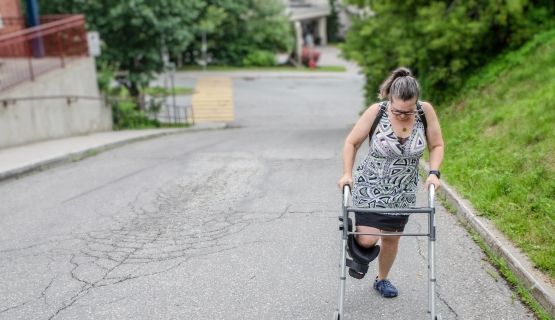Return to work, accommodation and support
IWH has a long history of conducting research on practices, policies and processes that help workers sustainably return to work after an illness or an injury. This page pulls together IWH research and resources on employer supports, job accommodations and modifications, as well as other related issues such as disclosure of disability.
Featured

At Work article
Injured workers face mental health challenges beyond diagnosable conditions
Workers with a work-related physical injury that takes them off the job can have a wide range of mental health experiences, beyond diagnosable conditions. That’s according to an IWH study which also found that differences in injured workers’ mental health were linked to return-to-work outcomes.
Published: April 9, 2025

Research Highlights
Examining four types of job disruptions due to a health condition, and the differences expected when workplace support needs are met
Job disruptions are common among workers living with chronic physical and/or mental health conditions, an IWH study has found. The study investigated the effects of workplace supports had on four types of job disruptions.
Published: March 11, 2025
Journal article
Journal article
Psychosocial work factors and diabetes: what is known and what is left to know?
Published: Journal of Diabetes, Metabolic Disorders & Control, August 2018

At Work article
Collaborative return-to-work program helps hospital lower injury claims, duration: study
An Ontario acute-care hospital and its unions set out to tackle high injury and disability claims rates by developing a collaborative return-to-work program. And according to an IWH implementation study, the results are promising.
Published: July 2018
Journal article
Journal article
Adverse effect of long work hours on incident diabetes in 7065 Ontario workers followed for 12 years
Published: BMJ Open Diabetes Research & Care, July 2018

IWH in the media
Hard-working women, go home earlier to avoid this disease
Here's a good reason for women to work less, ask for a raise or get their partners to pick up around the house more: If women work fewer hours, it'll lower their risk of diabetes, according to a study by the Institute for Work & Health, reports CNN's Jen Christensen.
Published: CNN, July 2018

IWH in the media
Working overtime could raise women's diabetes risk
Working lots of overtime may get you appreciation from the boss, but it might be bad for your health, writes Serena Gordon of U.S. News & World Report, about a new IWH study
Published: U.S. News & World Report, July 2018
Journal article
Journal article
Self-reported work conditions in Canada: examining changes between 2002 and 2012
Published: Canadian Journal of Public Health, July 2018
IWH Speaker Series
IWH Speaker Series
Challenges in accommodating mental and physical health conditions: What workplace parties are saying
In this presentation, Dr. Monique Gignac shares findings from a study examining organizational perspectives on implementing work disability prevention and management practices, as well as key issues in supporting workers with chronic, episodic conditions.
Published: June 2018
Journal article
Journal article
Are there differences in workplace accommodation needs, use and unmet needs among older workers with arthritis, diabetes and no chronic conditions? Examining the role of health and work context
Published: Work, Aging & Retirement, June 2018

IWH in the media
Work-focused CBT can help depressed employees remain on the job
A new review by the Institute of Work & Health has found that while generic cognitive behavioural therapy can help keep employees with symptoms of depression remain at work, it doesn’t have an effect on helping them return to their jobs. The review found, however, that work-focused cognitive behavioural therapy can help depressed employees both stay at work and return to their jobs after being absent due to depression.
Published: Benefits Canada, May 2018

At Work article
IWH’s new guide on supporting workers with depression integrates research with practice
Awareness is growing about the toll that depression can have on the workplace, but many are still unsure how to support workers and colleagues experiencing depression. To fill the knowledge gap, an IWH team has looked to the research literature, as well as current practices, to produce a guide.
Published: April 2018